#silco in flashbacks
Explore tagged Tumblr posts
Text
when I say I would let that autistic man rail me-
#hear me out now#young trey parker and matt stone#max goof#hiccup#kid flash#wally west#nightwing#dick grayson#steve harrington#eddie munson#aged up Kenny mccormick#brett hand#bobby zimeruski#kenny from jackson's diary#duncan from tdi#mordekai from regular show#silco in flashbacks#I'm tired of pretending guys#my heart literally clutches#audrey’s thoughts
17 notes
·
View notes
Text

🎶Our love, is a bubbling fountain... Our love, for eternity
#arcane#arcane silco#vander arcane#silco#vander#zaundads#arcane felicia#erio art#erio stuff#yes this is flashback old man yaoi
19K notes
·
View notes
Text

#silco#silco arcane#jinx and silco#my art#please don't repost#act 3 ouchhhh#i said i needed to be a serious artist and then arcane grabs my attention every week#arcane spoilers#I got my silco funerals#silco flashback#silco AU and silco hallucination#i win sometimes#and i'm not the kind of person who asks for much#silco says "walk away#Jinx understands “walk away from life”#it's fucking tragic is what it is#Jinx being the typical interpreter#it resonates#EDIT 13/12/2024 i forgot the blue light on jinx so i added that bc my ass was too tired i guess
5K notes
·
View notes
Text




different time, the same place, the same ache
#silco#jinx#arcane#arcane season two#arcane spoilers#spoilers#thinking about how silco got flashbacks of the time when it all fell apart#fortiche is diabolical for doing this ngl#not art#mine#kali rambles
3K notes
·
View notes
Text

Finally. Some good fucking food
My only criticism is that they made him look too clean! Let him live his ratman life!
#my art#sketchy sketch#arcane spoilers#arcane#arcane silco#silco arcane#I have already talked a lot about this flashback#but yea#I like the shorter rat hair more than manbun but I do not oppose manbun
2K notes
·
View notes
Text
so grateful silco died in season 1 because I can just imagine a world where he survived to act 3 and he’s at the final battle wearing a fuckass enforcers uniform and fighting alongside his oppressors with sevika
#arcane#arcane season 2#arcane critical#silco#they still managed to undermine his character with the flashbacks but at least my goat wasn’t ruined like roughly 80% of the cast was
731 notes
·
View notes
Text
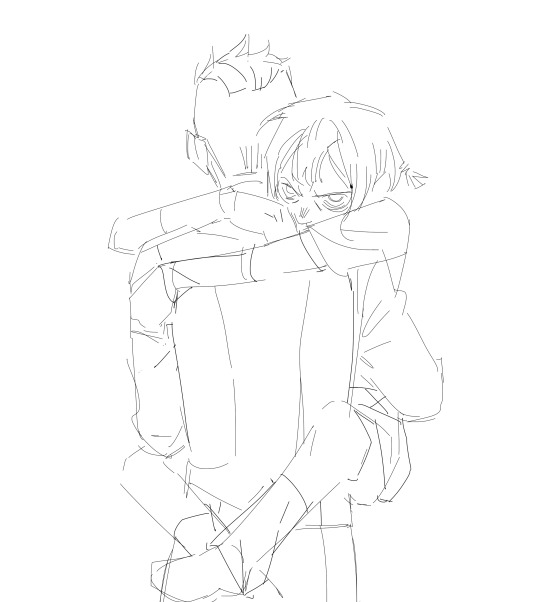
quick sketch
#league of legends#lol#arcane#jinx#silco#i need a flashback of silco being a dad to jinx in season 2 pls ;;
485 notes
·
View notes
Text
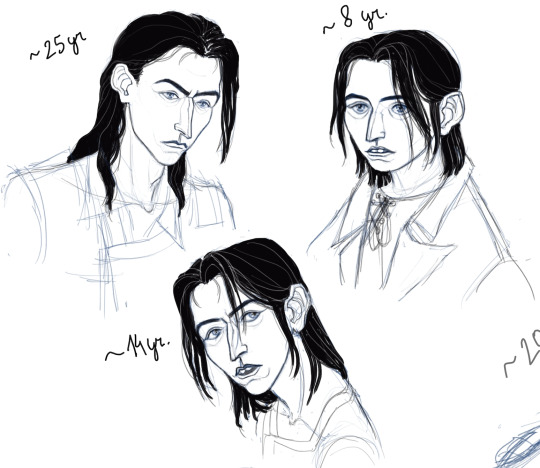
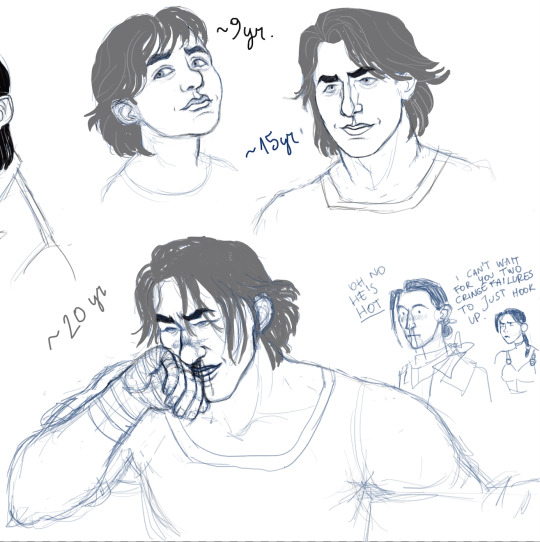
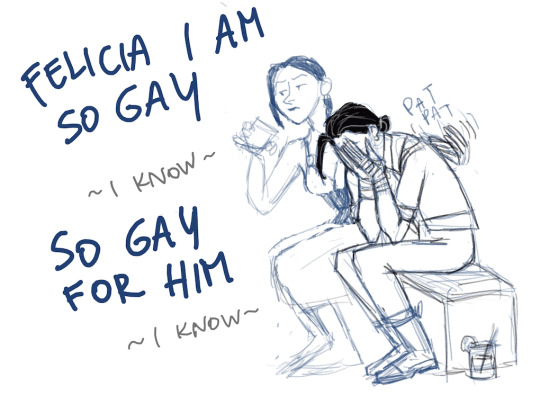
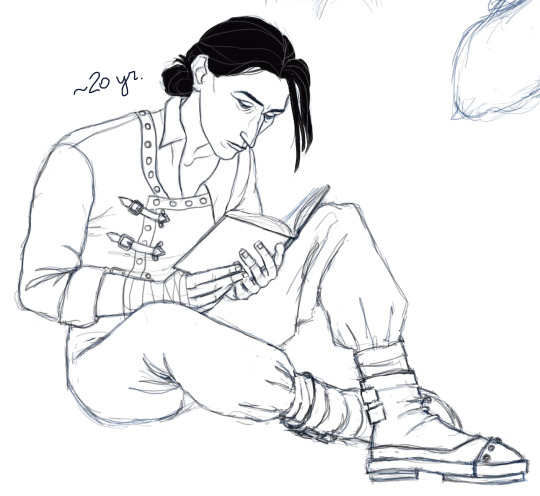

Sketchdump!
Haven't had the time to draw anything serious lately, so enjoy this very lazy age progression study, Silco being a nerd (and drunk gay panicking), and Vander being very hound-y. Bonus Felicia being done with their bullshit.
#i love baby Silco with all my heart#also hc that he had a VERY awkward teenage phase#he has some strong features and for sure had to grow into them#vander#silco#zaundads#felicia#my art#arcane#although i LOVE the sweet Bozos and Bozette flashback I wish s2 also gave us more hound-y vander and just these two being menaces together
307 notes
·
View notes
Text
Silco was set up to be Fishbones from the start
Disclaimer: I won't take season 2 into account At All, because it can't work with setups and payoffs even if its life depends on it.
Alrighty. As we've seen Season 1 paid a lot of attention to set up canon things from LoL into the show as naturally and logically as possible, and at least from my point of view, it handled the job with flying colors. Jayce's hammer, Vi's gauntlets, Vander/Warwick etc, nothing felt out of place. But how does Silco fit into this at all? Let's get down to business to defeat the huns
First of all, what even is Fishbones? In the canon of LoL, it's one of if not the most iconic weapon Jinx has. And it is not only a weapon to her, but a loyal and "beloved" companion, as it's described in one of her skins. She constantly talks to it, and in contrast to her chaotic and impulsive nature, Fishbones is very pragmatic and calm. Sounds like a certain someone, doesn't it? But let's not get ahead of ourselves.
But how does Silco go from being Jinx's father to one of her weapons? There are a lot of points that support that actually, I was surprised myself ngl.
- Silco is the only character in the entire series who is directly and tightly connected to water and underwater creatures. Silco was "reborn" in the water when Vander tried to kill him, the first office he had was placed under the water, with a huge observational window. Silco is also fond of underwater creatures, and while other people call and see them as monsters, Silco pays no attention to it, as he thinks that there's "a monster inside all of us". And here's Fishbones, who is designed after a shark, arguably the most famous "underwater monster". But what is more interesting is that it debuted is the finale of season 1, which is titled "The monster you created". Quite a throughline there.
- Silco was the reason behind Fishbones' creation in the first place. While it does seem that it all started with Jinx, who stole the hex gemstone on the Progress Day, we also need to remember WHY she did it. She did it to impress Silco specifically, to make him to be proud of her. This want was triggered by her screwing up the smuggling mission earlier that day, and while Silco didn't scold her for it much and only advised her to rest for a bit, she saw this as him thinking that she's weak. So, after all of this Silco asks Jinx to make a weapon with the use of gemstone. Not necessarily to use it against Piltover, but to have it as a wild card if his plans go wrong. Jinx agrees and attempts to reverse engineer it, but it triggers her memories when she killed Mylo and Claggor with her bomb, so she tells Silco that she can't do it. He then goes to the river he was nearly killed in with her, and "baptises" her to help her let go of her fear of pain. This seemed to have worked, at least for a little while, because she managed to finish the weapon. So, in conclusion: Fishbones' creation was triggered by Jinx's want to impress Silco, and he helped her with its creation on every step of the way.
- this point is somewhat meta, but I'll use it anyway. In previously mentioned episode 9 Silco tells Jinx that everybody around them betrays them, and they have only each other to love and lean on. He says, quote: "Everyone betrays us, Jinx. Vander, her. It's only us". At the same time, in LoL Jinx says this line to Fishbones: "It's just you and me, Fishbones!". Well.....it's certainly a callback if I've seen one. Like- it's not even funny. They couldn't have written this line on accident.
- now onto the most interesting part for me personally. We all now that there are no accidents in animation, like. At all. Even if there are this is extremely rare, as every frame is created intentionally. Now, we do now that there are quite. A few discrepancies between writers and animators of arcane, but I don't think this applies in this particular case. Now onto the actual point. So, in the finale of season 1 Jinx kills Silco, and it's shown to us like this.
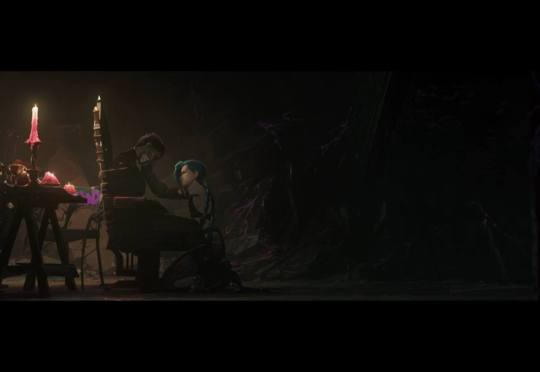
He's turned with right side ("human") of his face to the camera, while the left side ("monster") side is hidden.
As Jinx fires Fishbones at the council
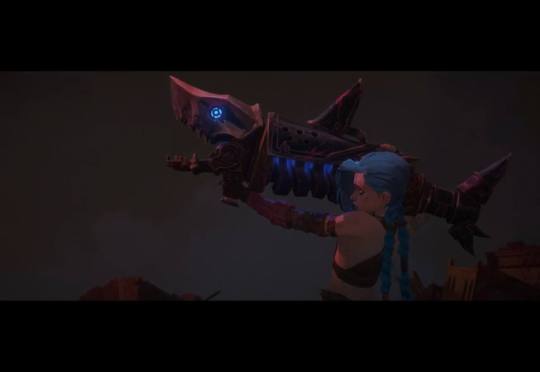
It's positioned with its right side to the camera, which alignes with Silco's "monster eye". Also, Fishbone's eye has a black scar pattern around its eye, which again, resembles Silco's damadged eye. That could mean that Silco is once again "reborn", and now continues to live on in the monster Jinx created.
And here comes the most awesome part in all of this. When Silco adopts Powder, he hugs her and tells her
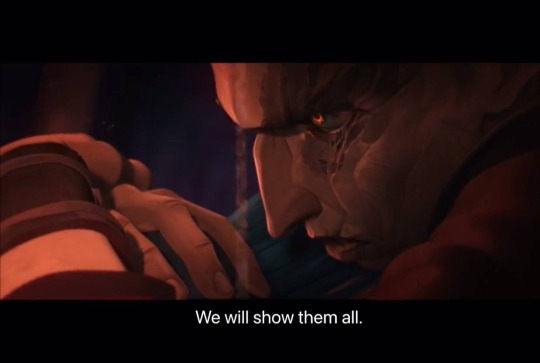
Do you see how the frame is positioned? Exactly. It is exactly the same framing scene with Jinx and Fishbones has. And, most importantly, when Jinx pulls the trigger, we hear the exactly same line on the background: "We will show them all". It simultaneously shows: that Jinx's attack on the council is her way of dealing with grief of killing Silco; her way of honoring Silco's fight against Piltover; and a direct transition of Silco into Fishbones. Although he's dead in body, but Jinx's memories of him and his voice now continue to live in Fishbones, her new eternal companion.
I am at awe with the fundamental work that's been done with this setup, and although s2 never followed up on this, I still can get enjoyment from the clear intent creators put here originally.
#we wouldn't even need flashbacks to show Jinx and Silco's relationship in detail if he'd spoke to her as fishbones#this would be the most awesome thing ever#and it still is. in my mind#arcane critical#silco arcane#jinx arcane#silco and jinx#arcane
353 notes
·
View notes
Text
God, I'm so fuckin bothered about what season 2 did to Vander and Silco's past too, like. Nothing makes any sense.
In season 1, you get "sssssome years ago I guess, before Vander had his old man beard, he sliced Silco's eye and then tried to drown him and we're left to wonder the details". That's fine, I never even questioned that.
Then season 2 is like, "Vander went into a rage when he saw Silco standing over Felicia's dead body on the bridge, further evidenced by the letter Jinx and Vi find"??
And I'm like, NO HE DIDN'T??
Vander was already much older than he was in the drowning flashback. Silco would have been recognizable to Vi in SOME way if he had been there, and I'm extending that. Silco would have been in Vi's life before that too.
Vander picked up the kids and walked home calmly after Felicia died, and like sure maybe he lunged at Silco and he ran away, so Vander took out his rage on another enforcer instead and went to find Silco later, but that means he didn't just "lose his head", he had plenty of time to process what happened and NOT decide that he was killing his best friend "for the greater good".
Why would he have blamed Silco at any point, let alone in that way? I dunno, there's having anger problems and then there's being fuckin dumb. Imagine being like, "oh no, I lost a close friend, guess I'll burn the other one too!" BUHH???
#starrspeaks#arcane#season 2#silco#vander#arcane criticism#I fucking HATE the 'x critical' format#it gives me war flashbacks#so nah#I don't hate S2 btw I just have a LOT of problems with it
282 notes
·
View notes
Text

silco, vander and benzo are so bloody cool looking here. im sort of obsessed with them. this looks like an album cover
#ahh i miss them#i want more silco vander flashbacks…im another life maybe#silco#vander#silco arcane#vander arcane#zaundads#arcane spoilers#arcane season 2 spoilers#arcane season 2#benzo#jinx#young! silco
269 notes
·
View notes
Text

THE DEFLATION 🦅OF OUR DREAMING🦅
in honour of the 2nd season coming out this week, i bestow upon you this ~~ my favourite dead fathers 🤩
didn't even plan it, was just sketching the top when taylor's 'how did it end' came on shuffle and suddenly i was possessed
progress pics/vid here
#the actual pain the lower illustration caused me is-#arcane#i am wishing praying that we get young silco pre-betrayal or a flashback to when he first adopted jinx PLEASEEE I BEGETH PLEADETH#arcane silco#silco#arcane vander#vander#silco and vander#taylor swift#artists on tumblr#digitalart#nausicaas art
200 notes
·
View notes
Text
I can't believe they character assassinated silco posthumously
#like they more or less fuck up everybody but it's extra funny with him cos he's dead#cos it's like they threw out the interesting nuanced shit#like now in retrospect it does seem like his mere presence gave jinx mental illnesses and without him she's immediately cured#but then they still go the route of insisting what a great guy and dad he was but through this corny shit#like sentimental flashbacks and knowing her mom and being her goddad and the fluffy alt timeline like asdfghjkjhgf#and now in act III they made him a centrist?????#silco#arcane#my:arcane#arcane critical#arcane s2
209 notes
·
View notes
Text




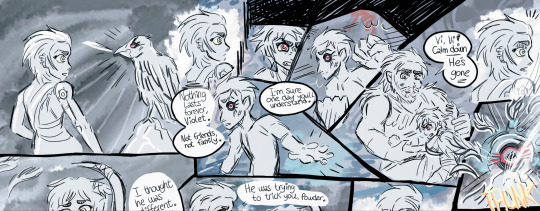




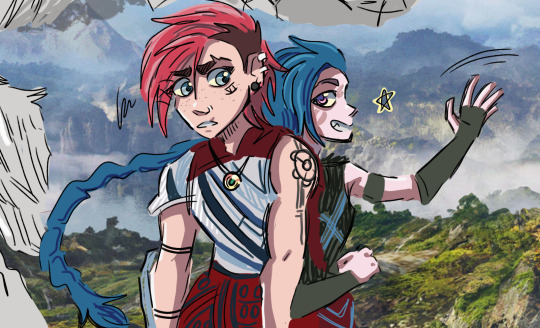
Here's the inevitable part 2 of the God of War Ragnarok x Arcane crack AU I had y'all 👍👍
These ideas obliterated me out of nowhere so I definitely went wild with them this time. I fleshed out more of the girls' origins and the drama with Silco who's on a spree for revenge on Vander.
Silco saves little Powder from a pack of monsters and she tries to give him a reason not to finish his quest for vengeance.
Unfortunately, their relationship isn't enough because Silco doesn't believe he can be saved. He uses his mind control power to manipulate Vi's anger + Spartan Rage against herself and Vander. Even so, Powder can't bring herself to kill him after seeing he's not entirely the monster they say he is.
The fight ends with Powder alone with Silco and scarred from the chains of Vi's blades of chaos. And of course Silco banishes Vi into another realm and assumes she would die from her injuries.
(Vander may or may not get revived and come back later stuck in his beast form bc this AU is tragic enough 😭)
I'll leave the rest to interpretation but this was a blast to draw! The Norse mythology theme is still my favorite and drawing the fight scenes and family stuff was the best part.^^
#fanart#my art#digital art#arcane#arcane season 2#arcane vi#vi arcane#arcane powder#arcane jinx#young vi#au#arcane vander#arcane silco#crossover#god of war#gow ragnarok#arcane warwick#norse mythology#flashbacks#comic#tw blood#chaos blades#vi is a canon spartan i dont make the rules#zaundads#vi and powder#vi and vander#powder and silco#family#gonna take a long break after this one i swear this possessed me for the past few weeks lmao#zaundad family
144 notes
·
View notes
Text
every time i read a post about how, "silco kept fighting relentlessly for a free zaun because it's what fELiCiA wOuLd hAvE wAnTed," i add another name to my kill list (in minecraft).
we'll never fucking undo the damage s2 has done to his characterisation.
let people believe in things bigger than themselves without needing some secret twist reason. let people fight for something because they observed an injustice in the world and decided to fucking do something about it, without needing a personal motivation tied to a tragic dead friend/family member/lover/whatever.
it is one thing for s1 to acknowledge that, while silco was always a true believer, his trauma at vander's hands is responsible for informing his view on the need for unflinching ruthlessness; for excising weakness. but s2 is now vander-ifying silco and fandom is eating it right up; making him 'more sympathetic' by suggesting that his determination to keep fighting in the first place was in some way tied to a lost loved one. because in a liberal media framework that serves the interest of capital, it is dangerous to suggest that someone can be motivated by purely ideological reasons and still be sympathetic. can still be right to want what they want, or do what they do.
i'm gonna make Outlaw Kings & Rebellion Chic required reading for everyone, and have included more extracts under the cut, but in summary:
Violence that does not proceed from personal injury requires no such breakdown. This kind of primarily ideological violence can be directed against a perfectly functional system - functional, at least, for the perpetrator - simply because it appears the ‘just’ thing to do. No wonder, then, that in our mass media, the characters practising ideological violence are cast as morally unsound. If normality is not self-evident but a site of contention, then it problematises easy narratives of rebels vs tyrants. And if dispute over the political system is enough to justify force, then that implies violence against the modern Western state, even its violent overthrow, could be justifiable. This is understandably concerning for many writers, who tend to come from backgrounds closer to the Lannisters than the ‘smallfolk’.
If a person can commit violence simply because they believe it’s right, without any hidden ambition, then nothing stops us from acting to change the world.
Separately, there is in screenwriting a kind of uncodified rule: villains act, heroes react. The hero, according to traditional Hollywood structure, can’t fulfil their destiny until an extraordinary event drags them out of the world they know. More often than not, that event begins with the villain. Harry Potter is only the Chosen One because Lord Voldemort killed his parents. Luke Skywalker would have stayed on Tatooine dreaming of adventure, until Darth Vader’s attack on a rebel ship sends a secret message to his farm. Frodo would be safe and happy in Hobbiton if not for Sauron. Heroes rarely set out to change the world. Villains want change, and heroes run to keep up. [...] Many of these characters live with occupation, oppression, and state brutality as part of their daily lives, but they don’t turn to violent resistance until their families are directly threatened or killed. When heroes commit political violence, it must be to avenge a personal injury. This is supposed to be substantively different from political violence committed for ideological reasons, which receives a much less sympathetic treatment. [...] When we see violent characters who kill for primarily political reasons, they are often anti-heroes at best, outright villains at worst. The idea of the full circle revolution - of the secret dictator hiding in the throat of every rebel leader, waiting to leap out and betray the non-ideological hero - is utterly pervasive. It appears in videogames, where good old-fashioned all-American heroes like Jim Raynor of Starcraft or Booker DeWitt of Bioshock Infinite are betrayed by villainous revolutionaries Arcturus Mengsk and Daisy Fitzroy (and after all they’ve done for them!). It is common in films, from supervillains like Magneto and Killmonger, liberationists written as would-be conquerors, to the rebels of The Hunger Games, who vote to continue the games as soon as they’re in power, except with the children of the dethroned elite rather than the children of the poor. The same reversal is mentioned in A Song of Ice and Fire, where rebel slaves, once liberated, enslave their former masters; in the TV version, an evil fundamentalist visits the kind of cruelty on the King’s Landing nobility that they visited on others. In all these examples we see an echo of the primal fear of every oppressive class, the nightmare at the heart of modern white supremacy: what if someone did to us what we’ve done to them? Liberation is re-imagined as the world turned not so much upside-down but mirrored. [...]
Rensin attributes the hatred of the High Sparrow to his hypocrisy, but I don’t think that’s quite right. What is terrible about the High Sparrow is that he has no personal grievance. He didn’t see his father killed by the ‘good guys’, like Killmonger. His family weren’t murdered by his oppressors, like Magneto. By his own account the High Sparrow was a cobbler who became disillusioned, found religion, and now, thanks to the vagaries of a civil war among the elite, finds himself in a position to overturn the social order. The feudal system of Westeros never injured him personally. He simply came to believe it should be torn down, and acted accordingly.
We seem to find this faintly repellent. We are so used to looking for an ulterior motive that, when we can’t find one, we grow uncomfortable. If a good person can commit violence simply because they believe it’s right, without any hidden ambition, then nothing stops us from acting to change the world. [...] Violence that does not proceed from personal injury requires no such breakdown. This kind of primarily ideological violence can be directed against a perfectly functional system - functional, at least, for the perpetrator - simply because it appears the ‘just’ thing to do. No wonder, then, that in our mass media, the characters practising ideological violence are cast as morally unsound. If normality is not self-evident but a site of contention, then it problematises easy narratives of rebels vs tyrants. And if dispute over the political system is enough to justify force, then that implies violence against the modern Western state, even its violent overthrow, could be justifiable. This is understandably concerning for many writers, who tend to come from backgrounds closer to the Lannisters than the ‘smallfolk’.
#i am begging everyone to please just ignore that fucking felicia flashback#singularly the worst thing to ever happen to silco as a character except maybe the 'walk away' monologue#arcane critical#silco#arcane
114 notes
·
View notes
Text
thinking about how ~the arcane~ in s2 which definitely wasn't just a rebrand of the void with targonian stuff thrown in for some reason was dealt with and getting mad about it again because the roots of a poisoned tree short story exists.
some mysterious magic related corruption of unknown origin spontaneously appearing deep underground that's affecting zaun environmentally? check. a powerful magic entity showing up to warn those who discovered it of its danger? check. the narrator recalling icathia, a lost city that became a dead wasteland after being consumed by the void, meaning that could be zaun and piltover's future if they don't come together to address the issue? check. boom, plot point achieved with no multiverse, no time loops, no demonization of hextech sending an anti science message, and no ripoff age of ultron final battle necessary since they could tie it all back to shimmer which was pretty obviously connected to the void.
#arcane#arcane critical#listen a shimmer chem spill is the perfect reason for viktor to make blitzcrank and it could later lead to the firelight tree contamination#and we could get heimerdinger and singed character defining flashbacks ft orianna lore AND we could get warwick flashbacks about what it wa#like working in the mines. also I think it would've made more sense for orianna to be dead dead instead of being in stasis bc why else woul#singed speak about her in past tense to silco in s1. basically orianna would use her og release lore where the real girl was dead and#the clockwork lady was a replica created by her father out of madness bc singed didn't need to make warwick a giant killing machine if he#just wanted the regen properties so I think warwick originally had nothing to do w orianna but the writers changed it for some reason#basically in my head orianna wasn't dead yet but was dying while kid viktor worked with singed and maybe parts of her body were being#replaced but the technology to do 2016 lore orianna didn't exist and upon seeing viktor's reaction to rio he realizes how cruel it would be#to do that to his own child. he does tell silco 'sometimes death is a mercy' after all#ANYWAY something something environmentalism and how it changes people and can create monsters#mine
55 notes
·
View notes